Adrian Collins's Blog, page 13
July 24, 2025
REVIEW: A City Dreaming by Daniel Polansky
I struggle with Urban fantasy—there, I said it. Actually, I should say “struggled” because Daniel Polansky has just flipped that opinion on its head with A City Dreaming.
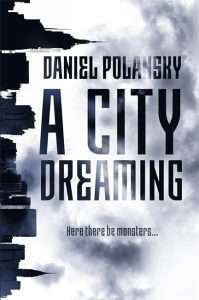 M is the kind of magic user where whatever capricious gods may be have gifted him with two key abilities: he can bend reality just enough to his will to be considered unreasonably lucky, and his gift of the gab shreds his enemies patience and confidence while annoying the absolute hell out of the people who put up with him. He’s a cheeky every man’s mage of sorts, who just happens to be a grouchy cynical fucker, old enough to have seen the start of last century and be fed up with humanity (and the fey’s) bullshit to the point where he just looks out for himself and the couple people he can stomach. Boozy–with a flair for the craft beer scene that I can certainly appreciate–and seemingly uncaring of the world around him, M fucks up when he lands himself in the middle of two would be gods. He’s the lone holder of a secret they both want, and M, at some point, will have to pick a side and stand for something.
M is the kind of magic user where whatever capricious gods may be have gifted him with two key abilities: he can bend reality just enough to his will to be considered unreasonably lucky, and his gift of the gab shreds his enemies patience and confidence while annoying the absolute hell out of the people who put up with him. He’s a cheeky every man’s mage of sorts, who just happens to be a grouchy cynical fucker, old enough to have seen the start of last century and be fed up with humanity (and the fey’s) bullshit to the point where he just looks out for himself and the couple people he can stomach. Boozy–with a flair for the craft beer scene that I can certainly appreciate–and seemingly uncaring of the world around him, M fucks up when he lands himself in the middle of two would be gods. He’s the lone holder of a secret they both want, and M, at some point, will have to pick a side and stand for something.
A City Dreaming is an oddly paced book (and if you look at our latest announcement you can see Polansky loves to experiment and try different things) with chapters almost feeling like non-sequential short stories, similar to a TV episodical like S1 of The Witcher. This can make it feel a bit like the big twists and hits don’t land for a decent part of the first half of A City Dreaming as we follow M through the worlds and mysteries of New York that sit outside we mortal’s realm of understanding and just on the other side of that misty alley, or that oddly placed 1920’s lamp post. And that’s probably one of the coolest things about this book, as you run through each episodical chapter and see M’s world, you just move the wider story to the back of mind and enjoy this mystical world around you, picking up key little flag posts for the big finale as you go.
As it was with Tomorrow’s Children, there is definitely another layer of awesomeness to this book where Brooklyn and New York kind of become this addition character to the story. It’s a cool sounding city for the characters to play in for most of us, and is drenched in extra layers of gold for the local readers and frequent travellers who know and love New York. Honestly, New York should send over a cheeky stipend to Polansky just for making me (and I assume others) want to go there based on how he depicts it in a fantasy world.
A City Dreaming is an absolute fever dream of magic and mystery delivered to you by a wonderfully broken protagonist. It’s what you’d get if you mixed Ben Aaronovitch’s or Luke Arnold’s imagination with Peter McLean’s cynical world weary badass characters.
Read A City Dreaming by Daniel PolanskyThe post REVIEW: A City Dreaming by Daniel Polansky appeared first on Grimdark Magazine.
July 23, 2025
INTERVIEW: Jackson Dickert from Between Two Perns
Author Jackson Dickert is what happens when you give a Brandon Sanderson fanboy a camera, a marketing job, and absolutely no supervision. He’s also the host of the aggressively charming YouTube series Between Two Perns and head of marketing at Campfire, a platform for writing, planning, and sharing stories. In his spare time, he is an aficionado of all things ray-like (the aquatic kind, not the eyewear). He sat down with me to discuss writing, bad decisions disguised as creativity, how Sanderson accidentally named his show, and his passion for all things science fiction and fantasy.
 [GdM] What is Between Two Perns, and what possessed you to start it?
[GdM] What is Between Two Perns, and what possessed you to start it?
[jDik] Between Two Perns is my completely original concept for a satirical author interview YouTube series. The uncultured may be more familiar with Between Two Ferns with Zach Galifianakis. On Between Two Perns, I ask questions ranging from the ignorant/stupid to the blatantly aggressive about the author, their career, and their books. It’s all in good fun, and the authors know what they’re getting into in advance.
As for what possessed me to start it, the paranormal entity in question would be Brandon Sanderson. In 2023, Dragonsteel flew me and others out to Salt Lake to film the Yumi and the Nightmare Painter book club video series. I can’t say enough good things about what kind and gracious hosts he, his family, and his team are. While we were there, Brandon took time out of his busy day to give all of his guests time to make content with him, only… I had no idea we would be getting such an incredible opportunity.
I tried to think of what on Earth I could ask him about writing and worldbuilding or his books that he hadn’t already been asked a dozen times. I came to the conclusion that I am not smarter than the average Sanderfan, because I had nothing. I decided to lean into my strengths: What if I asked him the dumbest questions imaginable?
I’d been a massive fan of his work for many years, so I quickly wrote moronic questions based on his career and books. When we sat down to record the show, he asked what it was called (he’d already been briefed on the concept).
I blanked. I looked at this man that I admire so much and I said the words: Between Two Ferns… author edition?
He smiled and thought for, I kid you not half a second, snapped his fingers, and said Between Two Perns. He got someone to run up to his library and grab two copies to put in the background, and the rest is history.
I was scared shitless looking Brandon Sanderson in the eye and calling him a plagiarist during that interview (while in his home (after he had fed me several excellent meals (after he let us raid their stock of paperbacks))). But Brandon took it all in stride and had funny retorts for all of my shenanigans. I’m very grateful he was willing to take a chance on such a fun format with an inexperienced interviewer.
So, yeah, Brandon Sanderson possessed me to start the show. Even though he fed me, used his equipment and team to film the video, carried the first episode, and named the show, is it too much to ask that he possess me while I write books for a change?
[GdM] Were you always a Pern fan, or did you stumble into that world sideways like a confused time-traveling Harper?
[jDik] Don’t ask me questions you already know the answer to just to make me look stupid. That’s my thing. Obviously, I wasn’t a Pern fan before. If I was, I could have named my own damn show.
[GdM] So what I am hearing is that you hate Dragon Riders of Pern, and by extension Anne McCaffrey. “It’s a bold strategy, Cotton. Let’s see if it pays off for ’em.”
[jDik] I’ve run into Todd McCaffrey at a few cons now. He’s a super nice guy, and I don’t just say that because I’m grateful he hasn’t sued my socks off yet. But, no, I’m afraid I still haven’t had the pleasure of actually digging into Dragon Riders of Pern yet…
[GdM] What’s your elevator pitch for a typical Between Two Perns episode? Once the pitch is set, what is your process like from start to finish?
[jDik] “Hey, *insert author name here* we’re going to be at the same convention. Wanna come to my hotel room filled with cameras and let me make fun of the career you’ve worked so hard to build?”
Gets ‘em every time. (It doesn’t, actually. The introverts hiss at me and melt into the shadows before my eyes. I don’t mind because it’s the kind of show that’s better off sticking only to guests who are enthusiastic about the format.)
After they agree, I do a lot of research. I stalk the hell out of them. Nobody ever talks about how much time and energy stalking takes. The hardest authors to interview are the ones who have one book/series or who seemingly have never had internet access. I love interviewing horror authors, because all those folks are real sickos. It’s easy to pick their story ideas apart and present them in an even worse light than they already present themselves. The authors who have no internet presence—I hate them. I like to make the interviews accessible to people who haven’t read their works, so I often dig at the author, their career, and broad concepts around their books. If they have no online presence, it’s harder to find funny questions/angles for the interview. You wouldn’t believe the stuff I find published on author websites, like their literal home addresses. (Lookin’ at you, Andrew Najberg.)
I take all the quirks, oddities, and angles I can find and do my best to write them into cohesive interviews that flow nicely with questions that set up punchlines or make it easy for the author to shine with some ridiculous answer. I think Sanderson’s interview took the least amount of time to write because I had followed his work so closely for so long and because I had extreme levels of cortisol driving me to do good work in very little time. The interview that took the longest to write was over forty hours of research and writing jokes.
[GdM] I think that this research is at the heart of why this show is so much fun and successful. You have to know quite a bit about whom you are interviewing to be able to know what questions that are funny or ridiculous. You have to know, deeply about the broad concepts in books for ribbing on Jim Butcher such as, “So why do you hate Chicago so much?”
 Author Jackson Dickert
Author Jackson Dickert[jDik] Yeah, Jim Butcher is a great example. I give him hell in that interview, but I didn’t read seventeen Dresden Files books because I dislike his work. I love the Dresden Files, and I’ll die on the hill that they’re even better to listen to than they are to read because of James Marsters’s god-tier performance on the audiobooks. Butcher’s interview was hard to write in some ways because of how much material there was to choose from and a desire to still make the interview accessible to people who haven’t read the books yet. My biggest hope for the series has always been that it could be a fun and unorthodox way for readers to discover new books/authors.
[GdM] Your work often walks the line between critique and celebration. How do you strike that balance without falling into cynicism or fanboy territory?
[jDik] I have an exhausting amount of empathy, a trait that I consider a really important component of comedy. I never want my comedy to cause actual controversy, come off as hateful, or hurt someone’s feelings. I’m sure I’ve deleted some excellent jokes that were completely above board just because I (or my anxious doting wife) overthought it. The balance stems from the roast aspect that the show has leaned more and more into over time competing with my personality. By the time I’m done going over the script a few times, the mean-spirited funny things and the empathy duke it out and come to terms with one another. It’s not really an intentional balance that I defined so much as it is baked into whatever went wrong with my brain development.
[GdM] It is the difference between punching up and punching down. You are obviously and ridiculously ribbing guests, you make them laugh. That is where the empathy comes into play. Making someone laugh, versus laughing at someone is a huge difference why folks keep coming back.
[jDik] That’s also why it’s nice playing the cocky moron character who perceives himself to be “publishing’s hardest-hitting interviewer”. It gives the audience someone to laugh AT, which is just one more tool in the toolbox for ensuring each episode doesn’t feel the exact same as the last.
[GdM] If you could interview any SFF character for Between Two Perns, who would it be and what’s your opening question? And to pay homage to a grimdark legend, what would your first question be to Jorg Ancrath?
[jDik] Gandalf, easy.
Me: Why didn’t you have the eagles fly them?
*Gandalf justifies it*
[GdM] “A (giant bird) is never late, nor (are they) early, (they) arrive precisely (before one is melted by lava).” —Gandalf (probably)
[jDik] They flew the bear dude in The Hobbit… Or was that the movies? Doesn’t matter, they were perfect adaptations.
[GdM] The Hobbit? Agree to disagree.
[jDik] For my first question to Jorg, I would ask him: When you broke your dog’s legs, did you give him painkillers afterwards or Just-ice it?
[GdM] When you’re writing Perns versus a novel like The Quest for the Golden Plunger, does the creativity come from the same chaos-goblin-infused place, or are those two completely different writing experiences?
[jDik] They come from the same place, but they’re two distinctly different experiences in the end. Writing humor in a book is fun because everyone always perfectly sets each other up for punchlines, almost like they’re characters or something. Interviewing authors has a huge element of unpredictability to it. They’re so annoying with their personalities and free will. Oftentimes I have to improv to tweak a joke’s wording in the moment so that it’s set up better since the authors don’t know my questions ahead of time and sometimes veer off the path I want them on for the punchline. It all comes from the same place, but the process is unique, different, and fun for both.
[GdM] Your voice is distinct. You blend humor and critique with sincerity and an obvious love for SFF. How did you develop that tone, and has it ever backfired?
[jDik] The tone comes from a sincere love of fiction. That passion allows me to acknowledge all the great things about it, recognize the bad, and appreciate the ways it changes over time. A big part of humor is putting things under a microscope and zooming in until the thing is bigger and more distorted than it actually is. Sometimes people leave comments on my videos that suggest I didn’t roast the author hard enough. But I think that’s everything wrong with the world right now. The point isn’t to roast someone for the sake of breaking their spirit. The point is to laugh, and that’s what I aim to achieve regardless of what form it takes.
It has never backfired. I am perfect. (Of course it’s backfired, and it’s the first thing I think about when I wake up in the morning and the last thing I think about before I fall asleep at night. Thank the Old Gods and the New that my wife doesn’t read Grimdark Magazine.)
[GdM] If it is any consolation as one who interviews quite a few people, this thought just gave me a stomachache.
[jDik] Thanks. Nick Martell, if you’re reading this, I’m sorry for dropping that bag of sand on your wrist, and hope you’re recovering well after surgery. I really thought that whole joke would go over better than it did. Be sure to delete this part of my answer, Beth, but between you and me, he was kind of a big baby about the whole thing. The sandbag was only fifty pounds.
[GdM] Do you think fandom is healthier today than it was ten years ago, or is it just louder and bigger? With the rise of adaptations, are movies and shows helping SFF grow, or are they boxing it in?
[jDik] I liked it when they split the last book of the Hunger Games series into two movies. I think we can all agree that two climaxes are better than one.
[GdM] What is one SFF trope you will defend with your last breath, and one you wish would die in a ditch after being hit by a runaway ox-cart?
[jDik] Have you heard of Dickert’s Bridge? It posits that if there is a rickety rope bridge suspended across a chasm, it must fall. All good fiction adheres to it: King Kong, Shrek, Pirates of the Caribbean, Temple of Doom, Dr. Stone, Kung Fu Panda, Emperor’s New Groove. Fiction it doesn’t happen in? George of the Jungle, Monty Python, and The Heresy Within by Rob J. Hayes. Notice a trend? Word on the street is that ML Wang calls it Dickert’s Bridge too, so I think it’s catching on.
What was the second part of your question? The trope I wish would die in a ditch? Probably Chekhov’s gun.
[GdM] Yes, because Chekhov’s gun is so overrated. I myself am a fan of extraneous detail that leads absolutely nowhere. Also, yes on the bridge. I still have fond childhood memories of watching Indiana Jones and the Temple of Doom, “Indiana Jones: [trapped on a rope bridge] Shorty! Short Round: Hang on lady, we going for a ride! Willie: Oh my god!”
[jDik] I liked the part right after that where Indy looks at the camera and says, “Golly gee, sure looks like we’ve gotten ourselves into a real Dickert’s bridge pickle, gang.”
[GdM] Who is an author that doesn’t get nearly enough attention, and why should readers check them out?
[jDik] I’m currently reading an ARC of my friend, Eira Brand’s, gritty cyberpunk debut, Run Like Hell, which released on June 30th. What I’ve read thus far has been fantastic, and I think the unwashed masses who stalk the shadows of Grimdark Magazine may enjoy it as well. I haven’t finished it yet, but so far it’s got a lethal dose of body horror, more action than your readers have ever gotten in their lives, and enough content warnings to kill a Victorian child. Even if cyberpunk isn’t your thing, look it up just to see the cover art, it’s gorgeous
[GdM] What is your favorite video game, and can you tell me why it’s Slay the Spire? (No judgment if you haven’t hit my 11.5k hours. Promise.)
[jDik] Slay the Spire is great. Wow, I’m really proud of you that you’ve only put in 1.5k hours in the last twelve months. This shows significant restraint and excellent time-management ability on your part. This is the first question I’ve answered 100% honestly. Assuming you started playing on the day the game came out, this means your previous averages were 1,538 hours per year. After 6.5 years, you’re finally cutting down on your playtime by a full 1.3 hours per week. This is amazing, you should be proud.
My favorite game is Dredge.
[GdM] I am both horrified and delighted with myself…no I am just horrified. What is it about Dredge that you enjoy so much?
[jDik] I love fish. I love spooky (not scary, they’re different, I swear). Dredge is the perfect intersection of spooky and fish. The music, art style, the writing… it’s incredible. The game’s progression elements naturally complement the gameplay and setting as well—you go fish up some normal fish, mutated fish, as well as dredge resources and artifacts from the bottom of the sea floor. You sell your catch, upgrade your boat, and head back out. It’s a tight gameplay loop that, along with the eerie atmosphere and a simple but satisfying story, makes for one of my favorite gaming experiences I’ve ever had. I 100%’d it twice on two different consoles. Normally I might be embarrassed about that, but in light of your 11.5k hours on Slay the Spire, I don’t think I have to defend myself.
For a book that has similar vibes, I would suggest The Fisherman by John Langan. It’s the perfect balance of literary fiction and cosmic horror with—you guessed it—fish.
 [GdM] I hear you are a manta ray enthusiast. What is it about the noble manta that draws you in?
[GdM] I hear you are a manta ray enthusiast. What is it about the noble manta that draws you in?
[jDik] In the shimmering depths of the ocean, the manta ray glides—a living embodiment of the indomitable will of the human spirit. Its vast, smooth wings ripple with a three-dimensional elegance that defies the clumsy unidirectional choreography of time, as though the creature evolved to trace the very edges of the cosmos yet finds meaning in our simple oceans as it moves with an effortless rhythm that transcends the mundane limitations of earthly existence and imparts joy upon the feeble minds of all who stand in its glorious presence. Each flap is a silent hymn to the nature of waves; a sacred and primordial shape found within the anatomy of each and every living person. The manta ray is a metaphor for life itself: graceful, playful, and infinite yet bound by the same existence humans are. These precious creatures are immense in their vulnerability, gentle in their treatment of other species, and radiant as they soar through the hearts and minds of all who witness them. This cartilaginous wonder has the largest brain to body ratio of any of its ichthyian peers, whose intelligences are as dim as the very depths they traverse. But the noble manta ray… to be in its presence is to glimpse the secret pulse of the universe, to bask in the moment two people fall in love, and to have an ear pressed to the chest of a newborn babe as it draws its first breath.
Plus, they were the first fish to go to the moon.
[GdM] You’ve broken your ankles four times, and you are a writer. That leads me to conclude your number one fan went complete Misery on you. Is that true, or is there a less terrifying explanation?
[jDik] I’ve also had two spontaneous pneumothoraxes, a broken collarbone, a kidney stone inflicted by a goddess’s curse (sounds like a joke—it’s not), had a mole removed by a person biting it off me, been stabbed in the shoulder, and survived rolling with Alexander Darwin. But you want to know about my ankles?
[GdM] I got to be honest the biting mole off thing, that made me most squeamish. That had to have happened while you saved an orphan from a burning building or something heroic… right?
[jDik] If only. The mole was lost saving my dumbass cousin in a fight at summer camp. He’d intentionally provoked a boy who was older and stronger. When my cousin’s face started turning cool colors, it was time to intervene. It’s unfortunate because while his ass kicking was very much deserved, the mole was just an innocent bystander. Boy Scout camp really is Lord of the Flies in khaki button-ups, and that’s what my first book, The Quest for the Golden Plunger, boils down to as well.
[GdM] What is next for you? More Perns, more plungers, or something completely unexpected?
[jDik] I’ve been working with Rob J. Hayes on The World of Heresy, a digital worldbuilding companion for his grimdark series, The Ties that Bind trilogy. It’s 120,000 words, has over 140 pieces of new art, and contains everything you learn about the characters and worldbuilding during the books along with new lore tidbits. It also has two new novellas Rob wrote that are set in the same world in addition to a short story written by yours truly. It comes out exclusively on campfirewriting.com this October, but early access is included in tiers of Rob’s special edition Kickstarter campaign this July.
I wrote a supernatural thriller with elements of cosmic horror that comes out next year called Backwoods Bargain. It’s a weird book with Greek gods, cryptids, and sociopaths with superpowers set in Appalachia. A big part of it is exploring the extremes of both ends of the empathy spectrum.
[GdM] When next year? This sounds like something our readers would dig. And also, can you return Rob to GdM. Thank you.
[jDik] Let me slink away and hide my crappy art in peace, Godsdammit Magazine. I don’t know when next year. You got me. Happy? The book is edited and done. The cover is done in two weeks. But I don’t have time to do a proper six-month marketing campaign for its release this year with some of the other (very cool) projects that I have the pleasure of being a part of. How about you pick when it comes out next year, and I’ll work around that?
As for Rob J. Hayes, no, I will not return Rob to GdM. My first name is Robert, and I am creating a coalition of author Robert Jacksons. It’s comprised of Robert Jackson Bennett, Rob Boffard/Jackson Ford (we voted to count it), Robert Jackson Hayes, and myself.
We call ourselves Rob J. Crew, which some blame for the sharp increase in shoplifting at J. Crew since our founding.
[GdM] You all have your own “Bobiverse” ready to go.
We have made it folks. Jackson delivers from his corner of the science fiction and fantasy universe. Whether it is his novel, The Quest for the Golden Plunger, his role as Chief Marketing officer at Campfire, a company that helps authors write, publish, and connect while storytelling, or the satire of Between Two Perns spiraling into increasingly elaborate projects powered by sarcasm and zero sleep. Jackson is here to stay because beneath the jokes and the fish facts is a creator who genuinely loves storytelling—and somehow makes the chaos goblins that run around his brain look like a brand strategy.
Check him out, I promise you will enjoy it and revel in his love for SFF.
This interview was first published in Grimdark Magazine Issue #43
The post INTERVIEW: Jackson Dickert from Between Two Perns appeared first on Grimdark Magazine.
July 22, 2025
REVIEW: Sublime Ablation by Victoria Hayward (from the Our Dust Earth anthology)
The Our Dust Earth kickstarter successfully wrapped just last month and I was fortunate enough to be sent one of the short stories by Victoria Hayward. Sublime Ablation is a morose, dry, hot, and quite brutal little story about a bounty hunter rotting from the inside who does one of the three things she kills people for: finds something she’s not supposed to find.
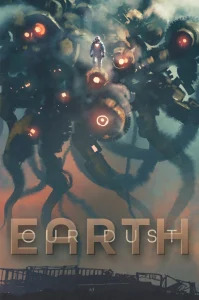
Sublime Ablation is going to appeal (as, I imagine, will the rest of the anthology) to readers who love short stories in post apocalyptic wastelands a-la Mad Max. The world building is sparse and weaved in really nicely to the story, using the protagonist Fulgin’s point of view to drip feed you the world, as opposed to dumping it on you. You can feel the relentless heat, hear the ticking of run down shanty buildings as they cool as the sun goes down, and itch at the radiation slowly eating your skin when you can’t afford or find the radiation medication. You can sense the desperation as Fulgim’s chosen career–the last stop job of the desperate–leaves her at the whim of the Agency as they hand out kill chits and radiation medical shots in return for murdering those that get in their way out in the wastes.
Sublime Ablation is a slower read, despite its sub-3,000 word count, and rewards the reader willing to look past there not being an immediate hook or danger on the opening page. I think that this pacing allows for a contemplative read, to ponder some of the things the author is talking about in this far future hell-hole: the power corporates have over people, the things we’ll do to each other to survive, and the way things that were built for one purpose end up delivering another outcome over time.
I enjoyed Sublime Ablation by Victoria Hayward, and think it well worth your time checking out the anthology, even just to check this out. Upon looking at the Kickstarter page, there is also a little TTRPG in the anthology, so you’ll get a world fleshed out by authors like Tory, and something you and your mates can sit down for an afternoon and play. Not a bad deal for those who managed to snag one of the Kickstarter editions. The publisher was looking to print 300 limited edition copies, and with around half sold, I’m hoping there is a second sale for the remainder of those copies because I want one!
The post REVIEW: Sublime Ablation by Victoria Hayward (from the Our Dust Earth anthology) appeared first on Grimdark Magazine.
July 21, 2025
REVIEW: Bloodborne – Ten Years Later
Bloodborne is one of the seminal Souls-like games and is something that was recommended to me if I liked “Castlevania, HP Lovecraft, and Ravenloft.” Which, by and large, I certainly do. It has been out for about ten years and pretty much the opinion has been decided on the game: it’s good, very good. Great even. However, there’s a decent chance you might not have played it even if you picked up Elden Ring. It was a PlayStation exclusive and remains so. I managed to miss it the first time around but as I did enjoy Elden Ring, I thought it’d be a fun excursion to try the game as an almost complete newbie. I would go in cold on the game and experience it as a player who was running it on the PS5.
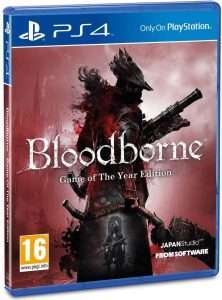 The premise of Bloodborne is left deliberately vague and the storytelling is primarily done through gameplay and inference rather than actual dialogue or narration. Still, it starts off as reasonably straightforward. In a Enlightenment-Era world of Muskets and Top Hats, you are a sickly man who has journeyed to the city of Yharnam to seek a supposed miracle cure. You take this cure but are forced to sign a strange contract before you do. You wake up in an abandoned clinic, find out the city is overrun with werewolves, and everything gets worse from there.
The premise of Bloodborne is left deliberately vague and the storytelling is primarily done through gameplay and inference rather than actual dialogue or narration. Still, it starts off as reasonably straightforward. In a Enlightenment-Era world of Muskets and Top Hats, you are a sickly man who has journeyed to the city of Yharnam to seek a supposed miracle cure. You take this cure but are forced to sign a strange contract before you do. You wake up in an abandoned clinic, find out the city is overrun with werewolves, and everything gets worse from there.
While not quite the technical marvel that Elden Ring would be, you can clearly see where most of that game’s best parts came from. The big differences between it and Bloodborne are that you can’t jump, you don’t use a shield (but a gun), and that the open world is much smaller as well as more compact. Even if these come with caveats as you can fall on top of enemies from above, the gun is the chief parrying mechanic (you shoot during enemy attacks), and the maps are incredibly well-designed to make use of every bit of space.
A comparison to Metroid or Symphony of the Night is warranted as much of the map’s use is based around the fact that you’ll discover shortcuts as well as ways to get around the vertical nature of the design. Much of a level’s exploration will involve backtracking but to discover hidden locations and secrets rather than simply as filler. For example, one of the earliest locations in the game is a multi-story clinic that you pass several gates to on your way out. Later in the game, you find a back entrance that will allow you to the second and third stories that have their own plots.
The monster design is fantastic with most early game enemies being human mobs, Wolfman-esque enemies, and full on-werewolves. As the Hunter, you ironically find yourself faced with other monster hunters and the corrupt Church of Healing as often as nastier enemies. These give way to massive giant enemies as befitting Dark Souls as the only thing better than fighting a werewolf is fighting a giant werewolf. My favorite boss in the game is a giant werewolf nun and that tells you the kind of wackiness you’ll find in Bloodborne.
Lore-wise, the world is extremely well-designed with the Lovecraft homages being a late-game addition that I won’t get into lest I spoil some of the enjoyment. Suffice to say, the game is best considered to be Gothic Horror for the first half and cosmic horror for the second. I love the NPCs as well with a definite “less is more” attitude with them: Gehrman, the Plain Doll, Eileen the Hunter and others are all awesome.
The design is where I really give the game its highest credit because the levels are beautiful beyond belief and successfully invoke the horror movie atmosphere in a way that is distinctly Japanese. It’s simultaneously so over the top that it seems like anime but still serious enough to be taken as horror. Yharnam is a massive ancient city with mammoth constructions but is on its last legs due to the Beast Plague. From the highest towers to the lowest sewers, you get to enjoy its amazing world-building.
The DLC, “The Old Hunters” is a fantastic expansion to the game and worth picking up if you enjoy the base game. It explains a great deal of the backstory to the game as well as provides context to the many Hunters who are mentioned throughout the game. It also contains a bunch of allusions to “The Shadow over Innsmouth” but with a more depressing take.
In conclusion, Bloodborne was a fantastic game in 2015 and remains so in 2025. Perhaps it’s not quite as impressive as Elden Ring these days but its gothic atmosphere and surreal mythology are all things that make it worth playing. The game is punishing for beginners but gradually you will learn the rhyme and reason of the combat system. A lot of enemies are better run around getting to where you need to go than run through. Even so, there’s a lot of ways to make the game easier too if you know where to look.
Play Bloodborne on PlayStation
The post REVIEW: Bloodborne – Ten Years Later appeared first on Grimdark Magazine.
July 20, 2025
REVIEW: The Crystal Heir by Brendan Noble
It’s always nerve-racking to pick up a sequel to a book you absolutely loved, especially one as boldly ambitious as The Crimson Court, but Brendan Noble is back and better than ever in The Crystal Heir. We’ve got more cutthroat political scheming, more dangerous Reacher magic, more shocking revelations and so many more emotional gut punches, resulting in a sequel that isn’t just satisfying, but absolutely masterful in every sense of the word. 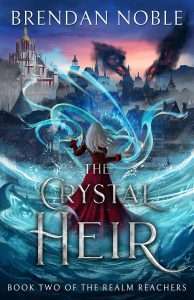 First of all, thank all that is holy for the ‘story so far’ section, I will never get tired of those. Though, even without that little summary of prior events, I think Noble does an excellent job of reconnecting the reader with our cast of scarred and morally grey chaos demons (as I so lovingly dubbed them when I first read book 1). From the moment I opened The Crystal Heir, I was just immediately reimmersed in this breathtakingly grand and epic Eastern-European flavoured flintlock fantasy world, and I think the start to this sequel could seriously not have been more gripping and engrossing.
First of all, thank all that is holy for the ‘story so far’ section, I will never get tired of those. Though, even without that little summary of prior events, I think Noble does an excellent job of reconnecting the reader with our cast of scarred and morally grey chaos demons (as I so lovingly dubbed them when I first read book 1). From the moment I opened The Crystal Heir, I was just immediately reimmersed in this breathtakingly grand and epic Eastern-European flavoured flintlock fantasy world, and I think the start to this sequel could seriously not have been more gripping and engrossing.
I mean, as much as I enjoyed The Crimson Court, there was a lot of set-up and teasing at bigger things to come, but from the very first pages of The Crystal Heir it’s clear that Noble isn’t going to waste any time delivering on his promises. The world instantly expands in both breadth and depth, be that in terms of the escalating (inter)national political conflict (both amongst the scions and between the scions and lowborn) after the Crimson Coup, the shocking revelations about the nature and ever-increasing threat of the spirits, the dangerous discovery of other Realms, or the exploration of the devastating impact of the different branches of Reacher magic on both the wielder and the people it is being used on.
However, the true highlight of The Crystal Heir for me is the fact that every single one of these characters just Goes Through It… real hard. The authentic exploration of themes of mental health, loss, classism, (physical) disability, corruption, sacrifice, and the cost of ambition and vengeance really shines brighter than ever before in this instalment, which added both a lot of heart and a lot of hurt to the narrative.
For me, Kasia, Nikoza and Nex (my fave from day one) were the true showstoppers in The Crystal Heir, precisely because their journeys were the most messy, frustrating and heart wrenching of all. Be it Kasia’s deep inner struggle to let people in and her escalating Realm Taint (hello unreliable narrator) due to her newfound Axiom powers, Nikoza’s battle between her heart and her (controlled?) mind or Nex’s continued fight against the scions’ oppression at the risk of their own safety and sanity, I was just so here for the intense drama and emotional turmoil of it all. What can I say, I will always love me some stubborn, complicated babes (totally using that term in a non-binary way, we respect & stan Nex here) who are desperately trying to keep their shit together while tearing down the system.
The other four POV characters (yes, we get two new ones, including a brief villain POV!) all really had their moments to shine as well, even if they didn’t all pull me in on the same emotional level. Still, I really liked seeing the ways that everyone clashed or unexpectedly came together despite their wildly different backgrounds and conflicting personal motivations, and the way that Noble balanced and interwove all their storylines was just so captivating. Also, this sequel focuses even more on the interpersonal relationships that lie at the core of this narrative and we get treated to some more (queer) romantic shenanigans that were equally heart warming and gut wrenching, which I absolutely ate up!
Now, The Crystal Heir is not a short read, and I have to admit that there were a few moments where I felt like this book would never end, especially in Radais and Wanusa’s chapters. But then at the same time, I also didn’t really want this story to be over because I just loved spending time in this world with these characters, so I can’t really complain. Moreover, this book simply does not have any bloat or filler content; every single scene furthers the overarching plot and/or the individual character arcs, and I think there is simply no denying that Noble is absolutely nailing his ambitious vision for this extraordinary story.
And as the cherry on top of it all, the visual presentation of this book is just as awe-inspiring as the story itself. I mean, not only is the cover art just an absolute gem (yes, pun very much intended), but the interior design and full-colour illustrations are also nothing short of breathtaking. We’ve got cool chapter headers, unique house emblems, gorgeous character portraits, and detailed war maps, all of which only increased my level of enjoyment and immersion (which were already through the roof to begin with).
The Crystal Heir honestly shattered all my expectations, and I think it’s just everything you could wish for in a great sequel. To me, the Realm Reachers series feels like an Eastern-European flavoured mix of the best aspects of ASOIAF and The Stormlight Archive, except make it even more imaginative, unique and exhilarating. I will be first in line when the next instalment drops, and I think anyone who loves a good dark, epic, political fantasy should join me for this wickedly wild ride.
Thank you to the author for providing me with an eARC in exchange for an honest review. All opinions are my own. The Crystal Heir is scheduled for release on 22 July 2025.
The post REVIEW: The Crystal Heir by Brendan Noble appeared first on Grimdark Magazine.
REVIEW: The Ragpicker King by Cassandra Clare
We return to the glimmering city of Castellane in The Ragpicker King, fresh off the massacre at the royal palace known as ‘The Shining Gallery Slaughter’. Kel is fully immersed in the ragtag group employed by the Ragpicker King now, and is actively investigating who was behind the massacre, in order to protect House Aurelian. The sequel also follows Conor, and how he is faring since the attack. Whilst he has always been the most enigmatic and careless of the two, he has since sobered up greatly, and has shouldered the expectations placed on him as the heir and future King of Castellane. On the other side of the city, Lin is dealing with the ramifications of her false display as the Goddess, where she is having to take this new identity on with stride, whilst also remaining unnerved by those who question the validity of her claims. These three storylines converge, each passing through one another to build a more intense and angst-filled plot throughout the course of the novel.
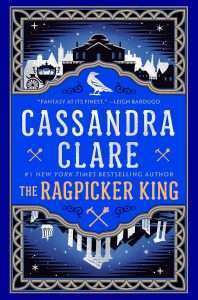 Lin and Kel are two sides of the same coin; both pretending to be someone they are not, whilst vehemently fighting to not lose their sense of self, and simultaneously doing so in order to protect the ones they love. Cassandra Clare managed to build the strongest foundations of brotherhood in the first book, so much so that the distance between Kel and Conor in the sequel feels almost painful to the reader. You yearn for them to see each other wholly and truthfully, without either of their plans in the way. It is a feat to create such a deep bond between two characters in just one book, and an even bigger feat to exemplify the depth of this bond by inching the two further away from each other in the sequel. The angst is palpable, and one that comes to a breaking point in the novel. On the other hand, Lin has been employed by Conor to care for the health of the King, another aspect to the story that is slowly growing and feeding the underbelly of the magical lore brimming within Castellane. This inevitably brings Lin and Conor closer, and whilst their romance is not at the forefront of the series, it is also brought to it’s breaking point in the novel. The Ragpicker King is charged with so much emotion, and done so well.
Lin and Kel are two sides of the same coin; both pretending to be someone they are not, whilst vehemently fighting to not lose their sense of self, and simultaneously doing so in order to protect the ones they love. Cassandra Clare managed to build the strongest foundations of brotherhood in the first book, so much so that the distance between Kel and Conor in the sequel feels almost painful to the reader. You yearn for them to see each other wholly and truthfully, without either of their plans in the way. It is a feat to create such a deep bond between two characters in just one book, and an even bigger feat to exemplify the depth of this bond by inching the two further away from each other in the sequel. The angst is palpable, and one that comes to a breaking point in the novel. On the other hand, Lin has been employed by Conor to care for the health of the King, another aspect to the story that is slowly growing and feeding the underbelly of the magical lore brimming within Castellane. This inevitably brings Lin and Conor closer, and whilst their romance is not at the forefront of the series, it is also brought to it’s breaking point in the novel. The Ragpicker King is charged with so much emotion, and done so well.
The pace is rapid, and picks up a lot faster than book one. This was expected, seeing that the world has now been fully established to readers and we are swiftly led through all the action that comes with such a colourful city and band of characters. There isn’t a lull at any point, and there is poignant action throughout, sure to keep the reader on their toes. Readers are set up perfectly for the plot twist of an ending; with all the cogs turning to orchestrate the perfect cliffhanger. For lovers of political intrigue, imbued in a city with enigmatic characters and settings, I would highly suggest picking up this series. Anyone who was impressed with Sword Catcher will be glad to pick up the sequel, with the politics and tensions only rising. Cassandra Clare has always had a knack for writing simply unputdownable books, and The Ragpicker King is certainly no exception.
Read The Ragpicker King by Cassandra ClareThe post REVIEW: The Ragpicker King by Cassandra Clare appeared first on Grimdark Magazine.
July 18, 2025
REVIEW: Seven Recipes for Revolution by Ryan Rose
Original is an over-used word in fantasy… principally by me. Everything can seem original, though nothing really is, of course. Except, maybe, Seven Recipes for Revolution by Ryan Rose, from Daphne Press, out 22 July? The author’s very own comparisons suggest something thrillingly new: The Bear meets Attack on Titan. An intense TV show about a restaurant, creation, and community meets… giant kaiju and a study on the factional cycle of violence? Okay, I’m listening. Turns out, Rose’s ‘commoner chef aims to brings down the elite with magic recipes’ tale is not only blisteringly original but races along like the best action movie you’ve seen all year, albeit with more brains and heart than any blockbuster would dare, and the result is a superb fantasy debut that suggests the future of the genre, at least partly, smells like Roses.
The plot of Seven Recipes for Revolution revolves around Paprick (spice name intentional), a ‘Common’ in the caste society of the kingdom of Ranch, who is a butcher for the rich, or ‘Rare’ of the kingdom, a vicious ruling group who enjoy meals containing the meat of giant kaiju-like animals, which grants them special magical powers. It’s commoners like Paprick who carve the meat, but never enjoy its fruits: these ‘Greater Recipes’ are for the elite only, at least until Paprick manages to create a new one for himself. Suddenly he’s the voice of the common folk’s rebellion, while simultaneously being made into one of the Rare elite and put through culinary school. The rich want his secret knowledge, and the poor want him as their figurehead, but what does Paprick want? His path will bring the whole world down around him.
The first thing to say is that this food and culinary-based society feels thrillingly original; not a gimmick, but a realistic world. I loved the small details: the traditional greeting to a new person is to throw them a food snack; the common folk are named after spices, and some of the ‘greater’ recipes themselves are interspersed throughout the book in their complete glory. It’s a great example of how proper worldbuilding technique can turn a quirk into a fresh new landscape. But more than that, Rose’s deep considerations of cooking and food comes through; there is a deep knowledge of the foundation of cooking—the flavours, the ingredients, the power of knowing how they go together—and it’s expressed with emotion bordering on reverence.
But even more than that, Seven Recipes for Revolution is a book with a message, conveyed with deep sincerity, of the power of cooking and food. At one point, someone asks Paprick why we cook. He answers ‘community identity’ and this is demonstrated by the book: from the home-cooked meals of Paprick’s moms to the kindness of another chef teaching him a magic recipe that will keep his exhausted self awake, to the narratively crucial idea of the same ingredients making different dishes in different cultures, the power of food and recipes to bring people together shines through powerfully via Rose’s excellent, emotive, yet efficient prose.
Around the food though is the brewing revolution and this is as electric, dramatic, and explosive as you’d hope. Rose isn’t interested in a simple ‘commoners versus the elite’ tale though—Paprick questions the revolutionaries’ methods, from violence to propaganda. Rose also uses well the narrative device of a future version of the main character relating the whole story to another (used here just as effectively as in its most notable recent iteration of Jay Kristoff’s Empire of The Vampire) to create the sense that what you are reading may itself be subject to the fog of war.
But put aside these meaty themes, and boy is Seven Recipes for Revolution wild, over the top fun. If the first half of the book is very culinary heavy, then the second half is a mixture of spycraft, betrayals, and secrets, and an addictively moreish mystery about the true ingredients for these magic recipes and where they come from. But then… then the promises of those earlier comparisons are kept and things get wild, both Attack on Titan-style and then, in one of fantasy’s most tense, thrilling finales, things zoom back into the tension of The Bear. And then back out into something truly demented from Rose’s glorious fever dream brain. This book felt like being on a narrative rollercoaster where you get thrown off at the end.
Overall, it seems like Ryan Rose couldn’t decide whether to write a stunningly creative ode to the power of good food and cooking or a breathtakingly thrilling page-turner, so he wrote both, and the result is a phenomenal and phenomenally original fantasy debut you have to read to believe.
Read Seven Recipes for Revolution by Ryan RoseThe post REVIEW: Seven Recipes for Revolution by Ryan Rose appeared first on Grimdark Magazine.
July 17, 2025
Originality and the Importance of Passion in Storytelling
In my last article I wrote of the importance of originality and passion when crafting a story in any medium. Media companies get a taste of success and end up rushing out copycats, sequels, prequels, and more without thinking too much about why the first effort was a success and what truly made it connect with its audience. Often, what we end up with is a mass of titles weaker than the original. Things get diluted and it gets easier to spot a TV series, or a film that has been released to cash in on a current trend instead of being something that has been created with passion and heart. Just after the last article was released, I was left with a dilemma. I love my story-driven games, the darker and more epic the better for me. Final Fantasy, Elder Scrolls, Fallout, God of War, Ghost of Tsushima, The Last of Us… the list goes on. I’m happy to give hundreds of hours to a game with a decent story and as a young adult, this is what I’d do—although, getting older meant more responsibilities and less time to play all the games I want.
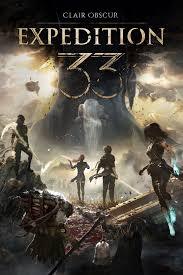 And then Elder Scrolls IV: Oblivion suddenly dropped. It was a remaster for the Xbox Series X of a game that I absolutely loved as a teenager and I couldn’t believe I’d have the chance to play an updated version, knowing that I’d be spending at least 100 hours completing it. But then, something happened that I didn’t expect. Clair Obscur: Expedition 33. I heard the hype, I saw something growing in the game community around this game that had come from nowhere with incredible voice acting, a story like no other, and a beauty in its design made by a small team making a choice that fans still wanted life in turn-based combat RPGs. Now, I only had time to start one of these games and thinking about that article in the latest Grimdark Magazine, I had to be true to myself and I chose Clair Obscur: Expedition 33.
And then Elder Scrolls IV: Oblivion suddenly dropped. It was a remaster for the Xbox Series X of a game that I absolutely loved as a teenager and I couldn’t believe I’d have the chance to play an updated version, knowing that I’d be spending at least 100 hours completing it. But then, something happened that I didn’t expect. Clair Obscur: Expedition 33. I heard the hype, I saw something growing in the game community around this game that had come from nowhere with incredible voice acting, a story like no other, and a beauty in its design made by a small team making a choice that fans still wanted life in turn-based combat RPGs. Now, I only had time to start one of these games and thinking about that article in the latest Grimdark Magazine, I had to be true to myself and I chose Clair Obscur: Expedition 33.
And my god I am glad that I did.
I’m not here to review the game (it’s incredible though, just go play it now), instead, I found that the game truly proved the importance of passion in storytelling. The developers spoke of their love of old school Japanese RPGs (in particular Final Fantasy) and that shines throughout every aspect of the game. But Expedition 33 isn’t some knock off or some clone. It is an original story and game wearing those games that have inspired it on its sleeve for all to see. I know there are some who claim that there are no truly original stories anymore and I understand that concept but there are ways of putting a spin on those that have come before. Expedition 33 plays it to perfection. It’s a blend of familiar and comforting and new and exciting.
Set in an alternate Belle Epoque France, the story centres around the Gommage, and event where each year, a goddess called The Paintress paints a new number on a monolith and everyone at or above that age disappears. Knowing in advance they would die, those with a year left to live often join expeditions to travel towards The Paintress and work out a way of halting this event and saving humanity. None have succeeded thus far and at the start of the game, you join Expedition 33. It is beautiful, dark, brutal, unforgiving, and just brilliant throughout. There are a lot of elements in the game that I recognise: turn-based combat, levelling up, relationship building, and so on, but every time I noticed someone I had seen before, there was a fresh spin on it that made it feel new and different.
The developers could have taken the lazy (and easy) option and just felt confident in their already brilliant story and then just used the same game mechanics we see elsewhere. No one would have moaned about it, the story would have still been lauded all over but they didn’t just do it. They knew they could create something unique, something special. They took care in developing every aspect of the game and giving the players something that stood out, even beside a juggernaut like Elder Scrolls. They cared about this game and that passion shines through every level you play through, it gives it so much heart and that makes the story even more powerful and memorable. The cherry on top of the brilliant bloody cake is the amazing voice actors. Voice actors who were chosen in blind auditions that landed an amazing cast with experience from Final Fantasy XVI, Baldur’s Gate 3, and Andy Serkis himself! And then they chose to sell the game much cheaper than the stupid prices most new games are released at. So, it is possible to create a much-loved, near flawless game without excruciating prices—it’s almost like they cared about people playing their game…
The reviews for Expedition 33 show that this fresh take has paid off. It is one of the best reviewed games of all time and millions of players have taken it into their hearts and are craving more. Whilst I would love to see more from the interesting world, I hope that as much love, care, and attention goes into anything from this team as it is an antithesis to those lazy games that get churned out quickly to cash in on player demand and feel soulless. Expedition 33 deserves much more than that and I feel like the team know that. At the end of the day, I feel like I definitely made the right choice with Expedition 33. I’ll get around to Oblivion, but after what feels like a thousand versions of Skyrim being released over the last decade, I don’t mind having an extended break from anything Elder Scrolls related.
 It wasn’t just the gaming world that came through with a passionate and well-constructed release since I last wrote. In the realm of TV, Andor blew my mind. Now, I’m a Star Wars fan, always have been and always will be. I’ve read the books, played the games, watched all the TV series (and there’s a lot!) and of course devoured the films. As a fan, I recognise that some of that output has been absolute drivel. The latest trilogy had moments that made me smile but overall, it bored the hell out of me. I didn’t mind too much, I could always go back to watch the films I liked and watch the numerous excellent animated series released in the Star Wars world. Some of the recent shows have been good, but nothing has really blown me away.
It wasn’t just the gaming world that came through with a passionate and well-constructed release since I last wrote. In the realm of TV, Andor blew my mind. Now, I’m a Star Wars fan, always have been and always will be. I’ve read the books, played the games, watched all the TV series (and there’s a lot!) and of course devoured the films. As a fan, I recognise that some of that output has been absolute drivel. The latest trilogy had moments that made me smile but overall, it bored the hell out of me. I didn’t mind too much, I could always go back to watch the films I liked and watch the numerous excellent animated series released in the Star Wars world. Some of the recent shows have been good, but nothing has really blown me away.
Then Andor came along.
This is how you create something original and with passion in a world created by others. This is how you expand on what has come before with a well-known intellectual property. Andor is a show that has been put together with passion and love and an awareness that it didn’t have to be like what has come before. It treats its audience as adults and doesn’t fall back on lazy easter eggs for a cheap pop from those watching. The episodes and scenes within are memorable because they are made for this viewing experience and no other. If you haven’t seen anything else to do with Star Wars, you would still be able to follow Andor and witness its brilliance. Every line delivered, every costume worn, every word choice and music played is done with absolute attention to detail. Tony Gilroy, the creator of Andor, pulls everything together like a great conductor and weaves a masterful story that stands against the greatest of TV shows released this century.
Creators who are allowed to use their love, their passion, and their inspirations to bring their work to life always end up creating things that stand out and are appreciated. Andor breathes new life into the Star Wars world. Clair Obscur: Expedition 33 seems to have brought back turn-based combat RPGs. Prey did something similar with the Predator universe like Alien: Romulus did for Alien. Passion truly does shine through and something original stays longer in the memory than any cheap imitation. I hope these examples are wake up calls across the industry that show what audiences want with their content. Both George RR Martin and Brandon Sanderson have recently spoken of how Hollywood has a habit of diluting stories with too many writers and differing ideas. Both Expedition 33 and Andor thrived without that stifling environment—Tony Gilroy said that the only note Disney gave him for Andor was to not say, ‘Fuck the Empire’. Stories that resonate come from the heart and passion will always shine through in these original stories. I hope these latest reminders give publishers food for thought when thinking of what to develop next.
This article was first published in Grimdark Magazine Issue #43
The post Originality and the Importance of Passion in Storytelling appeared first on Grimdark Magazine.
In the Shadow of their Dying shortlisted for a World Fantasy Award!
Last Updated on July 17, 2025
It’s the little novella that just keeps on kicking goals. The success of In the Shadow of their Dying by Anna Smith Spark and Michael R. Fletcher saw us able to start an actual novella line of publications, with Casthen Gain by Essa Hansen releasing on the 28th of July and The Scour coming from Richard Swan in October. It was picked up by W.F. Howes and narrated by Emma Gregory for audio production (check out a sample here) and turned in to a 1,000 copy signed limited hardcover with sprayed edges by the legends at The Broken Binding (special edition shown below because it’s utterly gorgeous).
And now, a year and a bit since being published after four long years of development, In the Shadow of their Dying finds itself nominated for a World Fantasy Award for best novella of 2024. And when you consider the other novellas on the shortlist, it’s a pretty awesome achievement to have landed amongst some of the best novella writers in the business.
The full best novella shortlistThe best novella shortlist is an incredibly impressive one, and I am stoked our little book is a part of it. Just look at those authors. Our team stand amongst some amazing authors and publishers:
Crypt of the Moon Spider by Nathan Ballingrud (Tor Nightfire/Titan Books)In the Shadow of Their Dying by Michael F. Fletcher and Anna Smith Spark (Grimdark Magazine)Yoke of Stars by R. B. Lemberg (Tachyon Publications)The Woods All Black by Lee Mandelo (Tordotcom)The Butcher of the Forest by Premee Mohamed (Tordotcom/Titan Books UK)We’ve published reviews of books by Nathan Ballingrud, Lee Mandelo, and Premee Mohamed and their works often make our best of and most anticipated lists, so I certainly will be finding something or someone to sacrifice to the publishing gods on Anna and Fletch’s behalf.
Read In the Shadow of their DyingHaven’t read our awesome little novella yet? Do yourself a favour and grab a copy below.
The post In the Shadow of their Dying shortlisted for a World Fantasy Award! appeared first on Grimdark Magazine.
July 16, 2025
REVIEW: Conan the Barbarian #21
Emotionally adrift after the death of his pirate queen Bêlit, Conan wanders his way aimlessly through the jungles of the Black Kingdoms. An encounter with a pampered princess from Ophir once again gives him purpose, however. After rescuing her from an attempted human sacrifice, Conan and his loyal tribe of Bamula warriors journey northward, hoping to deliver Princess Livia from the jungle and into the hands of someone who can get her safely home. As they reach the border town of Daynt, nestled between Kush and serpent-haunted Stygia, the party receives an astonishingly gracious welcome. Naturally, Conan is instantly suspicious. In the dead of night, he sets out to uncover the darkness lurking behind the villagers’ obsequious smiles.
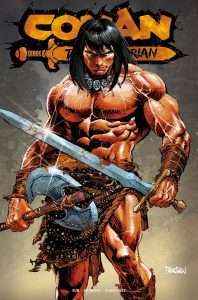 In terms of the Titan Comics Conan the Barbarian chronology, the “A Nest of Serpents” story arc that launches with this issue takes place after “The Age Unconquered” (Conan the Barbarian issues #9-12). For readers of the original 1930s short stories by Robert E. Howard, it’s interesting to note that this issue takes place immediately after the events of “The Vale of Lost Women.” Never published during the author’s lifetime (and possibly never even submitted for publication by Howard), “The Vale of Lost Women” occupies an uneasy place in the Conan canon. Not only is it a lesser effort creatively, the casual racism endemic in 1930s America is more prominent here than in the lion’s share of Howard’s work, and there are hints of sexual violence as well. The Conan appearing in “The Vale of Lost Women” is uncharacteristically brutish, and the dismissiveness with which he regards the African-coded inhabitants of the Black Kingdoms also doesn’t make sense if the story takes place after Conan’s extended tenure among the majority Black crew of Bêlit’s pirate ship.
In terms of the Titan Comics Conan the Barbarian chronology, the “A Nest of Serpents” story arc that launches with this issue takes place after “The Age Unconquered” (Conan the Barbarian issues #9-12). For readers of the original 1930s short stories by Robert E. Howard, it’s interesting to note that this issue takes place immediately after the events of “The Vale of Lost Women.” Never published during the author’s lifetime (and possibly never even submitted for publication by Howard), “The Vale of Lost Women” occupies an uneasy place in the Conan canon. Not only is it a lesser effort creatively, the casual racism endemic in 1930s America is more prominent here than in the lion’s share of Howard’s work, and there are hints of sexual violence as well. The Conan appearing in “The Vale of Lost Women” is uncharacteristically brutish, and the dismissiveness with which he regards the African-coded inhabitants of the Black Kingdoms also doesn’t make sense if the story takes place after Conan’s extended tenure among the majority Black crew of Bêlit’s pirate ship.
Rather than go through elaborate contortions to salvage “The Vale of Lost Women,” Conan the Barbarian scribe Jim Zub simply uses the events of the short story as a launching pad for his own original tale: Conan is deep in the jungle, surrounded by local warriors, and has a delicate princess that he must escort to safety. The climactic bat-winged “devil from the Outer Dark” is shown in the opening pages of this issue, so readers do not miss out on anything by not receiving a full adaptation. Masterfully handled, Zub!
Conan the Barbarian #21 brings aboard a new artist for the monthly title, Fernando Dagnino. A DC Comics veteran, Dagnino’s work previously appeared in The Savage Sword of Conan #4. I rated his art highly then, and he continues to impress in this full-length issue. While he cites several other Conan artists as influences in the post-issue interview, Dagnino’s depiction most reminds me of Ernie Chan’s. He captures the brawn and ferocity of Chan’s classic representation while avoiding slavish imitation. His costume work in this issue is also worthy of note; newly introduced Stygian sorceress character Athyr-Bast is particularly impressively outfitted.
While the “Scourge of the Serpent” event miniseries doesn’t begin in earnest until September (excepting the Free Comic Book Day prelude), the dark Egyptian-inspired land of Stygia and the snake cult of Set have figured prominently in this year’s Conan the Barbarian issues. As the story arc title “A Nest of Serpents” suggests, this issue continues the trend, also reintroducing a fan-favorite villain previously teased at the conclusion of Conan the Barbarian #18.
Issue #21 takes the best elements of a forgettable Conan short story and sets to work making something more interesting out of them. Fernando Dagnino also makes a strong addition to the stable of Conan the Barbarian artists.
Conan the Barbarian #21 by Jim Zub (W) and Fernando Dagnino (A)The post REVIEW: Conan the Barbarian #21 appeared first on Grimdark Magazine.

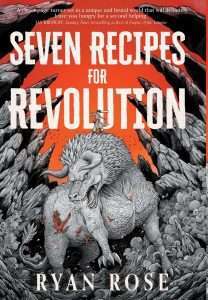

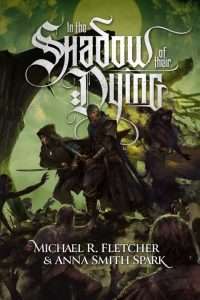 Read on Amazon
Read on Amazon

